699 Search Results for communication book
May 21, 2014
by Carole Zangari -
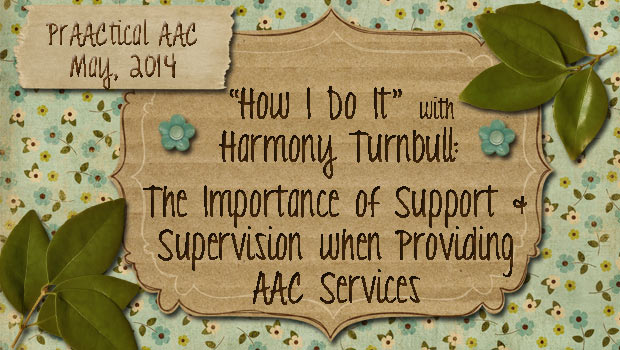
We are so thrilled to have a guest post today, from Australian SLP Harmony Turnbull. Harmony is a Consultant Speech Pathologist for Ageing, Disability and Home Care in NSW, Australia. In her role, she provides support and supervision to senior speech pathologists, carries a small caseload of people with complex needs and provides expert consultancy for management. She has specialised in supporting people with disabilities including complex communication needs for 11 years and is addicted to networking. She can often be found sharing her knowledge and asking many questions on Facebook and Twitter (@SP_Harmony). Harmony is passionate about the work speech/language pathologists can do to improve the quality of life for people with disabilities. The Importance of Support and Supervision when Providing AAC Services Scenario – Jane Jane is an SLP who has been working with people with disabilities for over 5 years, including people with complex communication needs. Her caseload... [Read More...]
May 19, 2014
by Carole Zangari -
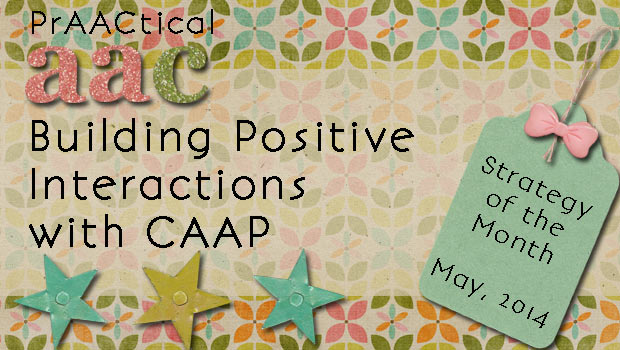
One of the challenges in helping AAC learners maximize their communicative potential is that they often interact with people who do not facilitate positive interactions. We know, for example, that partners may focus on the SGD rather than the topic or communicator (e.g., “Can you find ‘go?’, “Press it again”). They may dominate the conversation by taking more than their fair share of turns, making for a lop-sided and uninteresting context that is more of a monologue than a true conversation. They also tend to interrupt the AAC learner, often in an attempt to guess the learner’s message, save time, or correct the person. These actions come from a good place (wanting to support the learner) but are not things that facilitate improved communication. In a previous post, we talked about the RAAP strategy, for building partner skills during storybook reading. In this post, we continue to share the work of... [Read More...]
May 14, 2014
by Robin Parker -
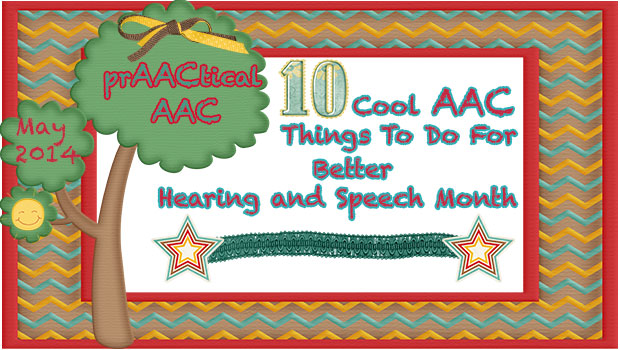
Learn with AbleNet University. Watch excellent free AAC webinars. There are live and recorded webinars so you can learn at your convenience. Share the information with colleagues and families. Give an AAC Gift. Create AAC informational bookmarks and distribute to educators, staff, and families. Print some free communication boards. Go to the PrAACtical AAC e-Tool Box and print out some great core word or activity specific communication boards. Put in your AAC clinic tool box or share with educators or families. Debunk AAC Myths. Use our AAC Myth buster quotes. Print and hang in public spaces so everyone can be an AAC myth buster. Learn and PrAACtice a New AAC System (device or app). Go to prAACtical AAC’s Teach Me Tuesdays and choose an app or device to learn- (Alexicom, Proloquo2go, PRC Accent, The Grid, Tap Speak Button & Sequence, Avaz, Tobii C8, Proloquo4Text, Go Talk Now Text, Nova... [Read More...]
May 12, 2014
by Robin Parker -
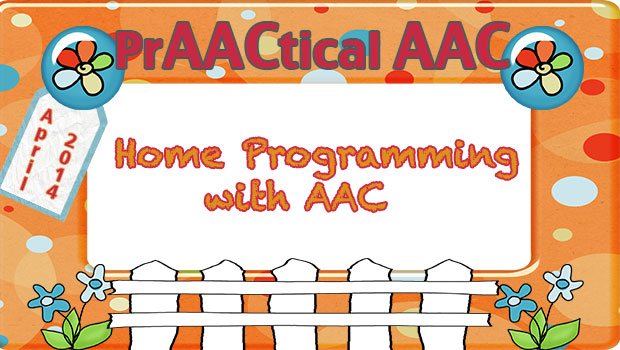
As SLP’s we love to have families learn and carryover the work we do in speech-language treatment sessions. This helps ensure carryover of progress and generalization of therapy success. However, as Carole clearly illustrated last Monday, there are a lot of family dynamics, cultural issues, and family challenges that make adding extra work possibly burdensome. We really (really) do not want to burden families, but its beneficial to have AAC communication happen all day long. We once had a client who had a very huge house with lots of bedrooms, but mom chose to keep her children together in one bedroom. This was just in case the AAC user woke in the middle of the night. Then she would have someone close by as a communication partner. This was a family who took home programming to the max and expanded and modified it to fit their family. A main issue... [Read More...]
May 5, 2014
by Carole Zangari -
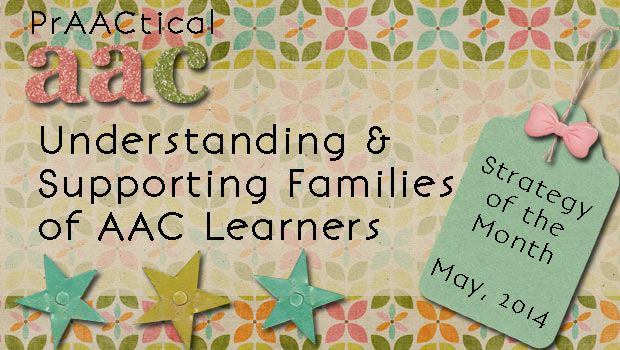
Let’s start with a basic premise: We can’t maximize AAC learning outcomes unless we’re working well with families. This is easier said than done, especially in some settings. As a clinician in a university clinic, for example, seeing families is the norm. We get to interact with them before and after the therapy. They get to observe or participate in the session. We can show them the data, observe how they interact with the AAC user in their family, and answer questions as they arise. And even with all of that, supporting them is challenging in that it takes time, skill, and planning. Although it is one of our favorite things to do, it’s not always easy to align our actions with our (stellar, ambitious) intentions. Multiply that by a factor of a zillion for our colleagues in schools and other settings where frequent, casual interactions are difficult to come... [Read More...]
April 17, 2014
by Carole Zangari -
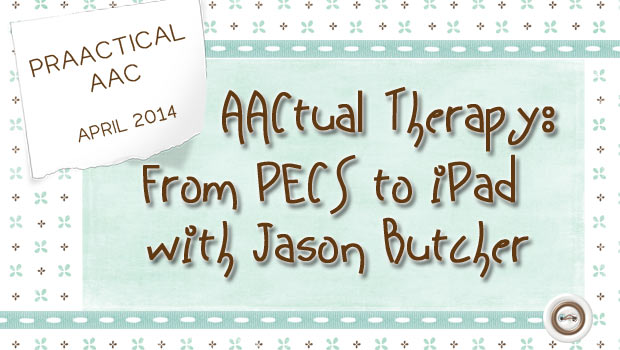
We are pleased to share a guest post by SLP Jason Butcher, who serves students at Grant County Middle School. Jason has been working with middle and high school students for the past 14 years. He earned his Master’s in Communication Disorders from the University of Kentucky in 1999. He admits that he came to do AAC more out of necessity than interest due to serving a huge variety and degree of speech/language impairments on his caseload. He has always enjoyed working with technology and is patient when fixing problems, qualities that he thinks have served him well when hitting the inevitable roadblocks that come with working in the area of AAC. In this post, Jason shares some candid thoughts on the transition from PECS to an iPad for a student with whom he works. It was nearing the end of September when I began to fear that Ms. Ruff, a teacher... [Read More...]
April 16, 2014
by Carole Zangari -
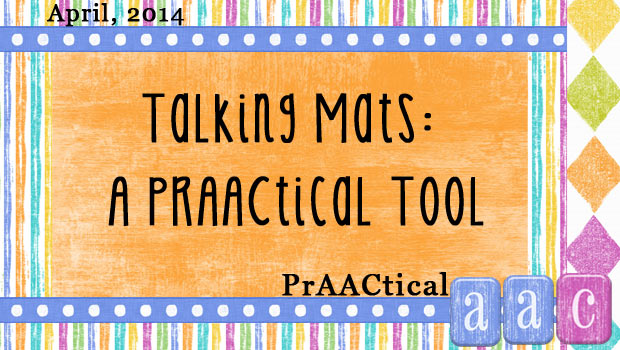
We’ve shared about Talking Mats in a video and on our Facebook page, but we needed to call on the experts to go into more detail about this approach. Thankfully, the co-directors of this project, Dr. Joan Murphy and Lois Cameron, were willing to collaborate. in this post, Dr. Murphy shares her knowledge with us. Hope you enjoy learning about the implementation of Talking Mats as much as we did. What is Talking Mats? Talking Mats is an innovative, award-winning communication tool which is based on extensive research and designed by Speech and Language Therapists in Scotland. Our vision is to improve the lives of people with communication difficulties by increasing their capacity to express their views about things that matter to them. Talking Mats is an interactive resource that uses three sets of picture symbols – top scale, topics and options and a space on which to display them.... [Read More...]
April 3, 2014
by Carole Zangari -
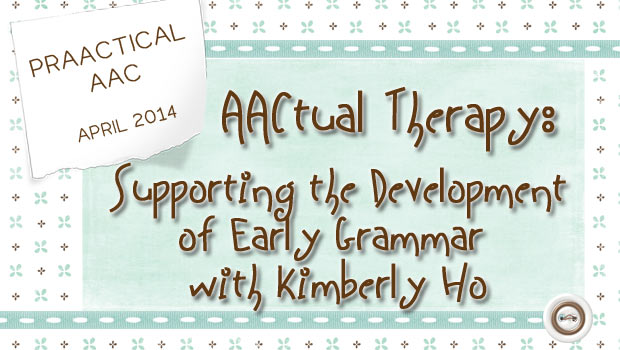
Our guest post for today is from SLP Kimberly Ho, an AAC specialist who operates a private practice, AAC Services. I met Dr. Ho many years ago when she was getting her master’s degree at Purdue University. She went on to get her doctorate and now consults for a number of public schools and works with individuals with AAC needs from preschoolers to adults. Kimberly is active in teaching (undergraduate and graduate courses), writing (published three articles in peer reviewed journals) and public speaking (15 presentations at regional, national and international conferences). In this post, she discusses some concepts in teaching grammar to people who are learning AAC. Traditionally, individuals with complex communication needs (CCN) were provided with communication boards or speech generating devices (SGDs) filled with topic specific vocabulary often called fringe words. The field of AAC is only just beginning to provide early communicators with access to Core... [Read More...]
April 1, 2014
by Robin Parker -
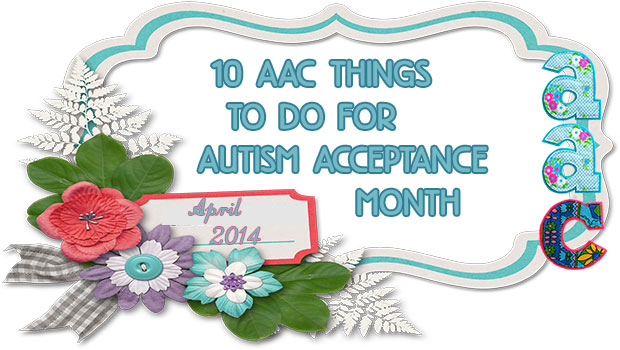
We love Autism Awareness and Acceptance Month. There is so much excitement and great community activities. The month becomes very busy so we love choosing events and projects that facilitate autism acceptance and AAC learning. We pass out materials, have contests, do extra trainings and have many public awareness events. We make sure to support our events and activities with AAC materials. Here are some of the things we do and recommend to support AAC and Autism learning. Please share any activities or projects that you know about. Bake, share, & eat some desserts. Use and include visual recipes when cooking. Need inspiration?.. Go to Your Special Chef for shopping lists and recipes. Educate peers visually by using the Autism Acceptance Book: Being a Friend to Someone with Autism by Ellen Sabin Develop & Use a personal participation story (modified social story) to let alert someone that this will... [Read More...]
March 22, 2014
by Carole Zangari -
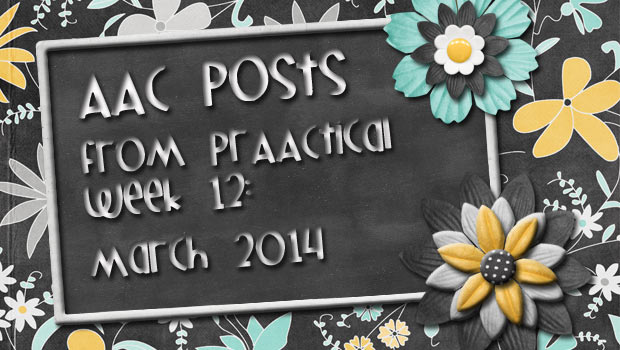
It’s prAACtically spring in much of North America! To all of our friends who suffered through a c-r-a-z-y winter: You made it!! Here’s what we’ve been up to. Sunday: Video of the Week – A Right to Communicate Monday: Strategy of the Month – Building Communication Skills During Storybook Reading Tuesday: Teach Me Tuesday – Predictable App Wednesday: On Communication and Behavior – Back to Basics Thursday: AACtual Therapy with Jeanne Tuthill – An AAC Assessment Activity Friday: 5 Resources for Creating AAC and Visual Support Materials









